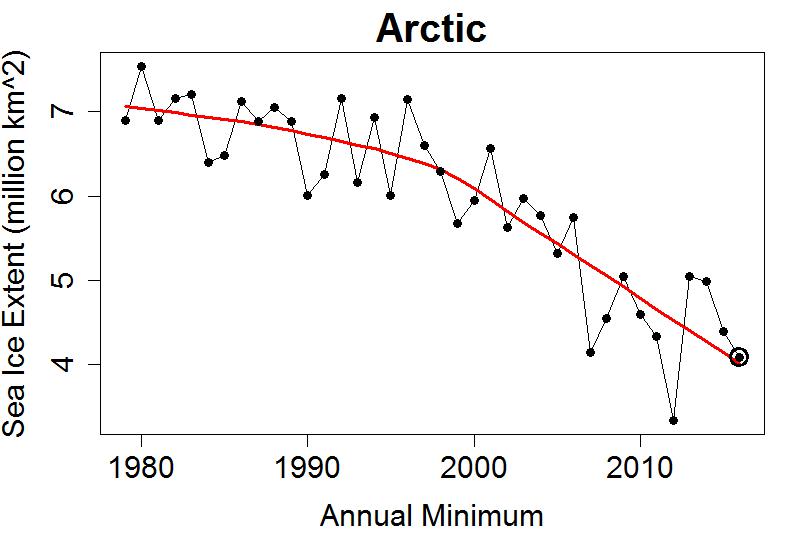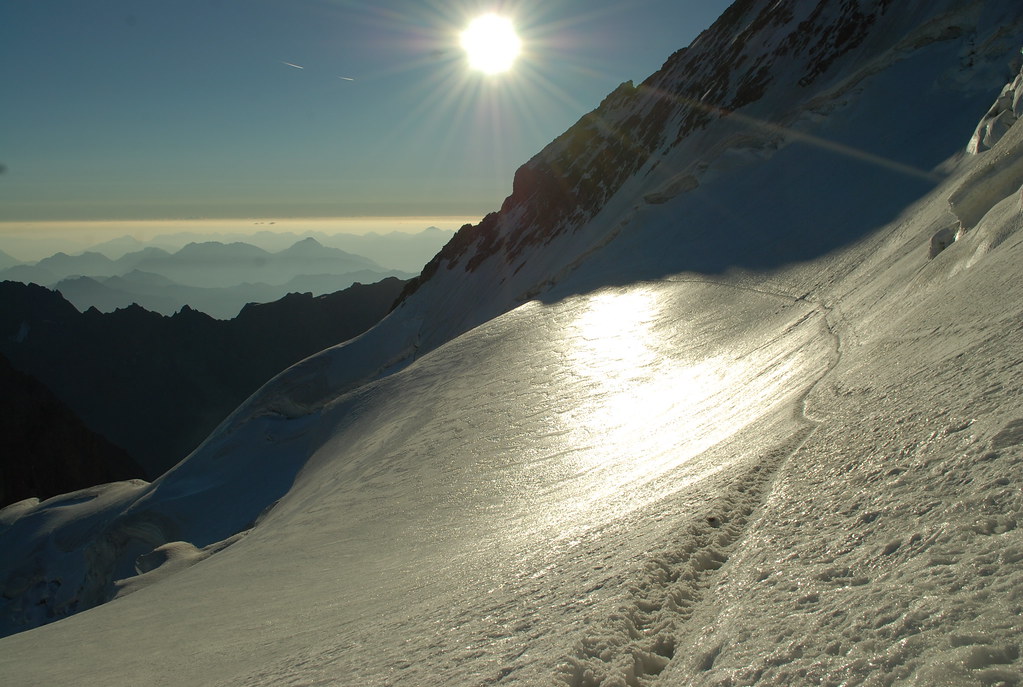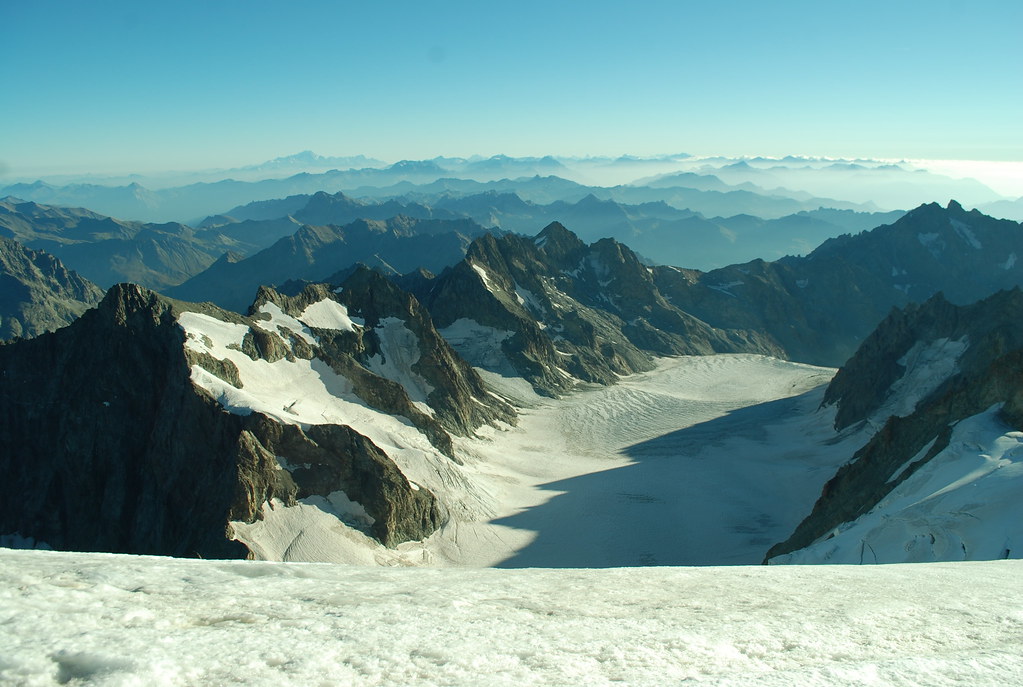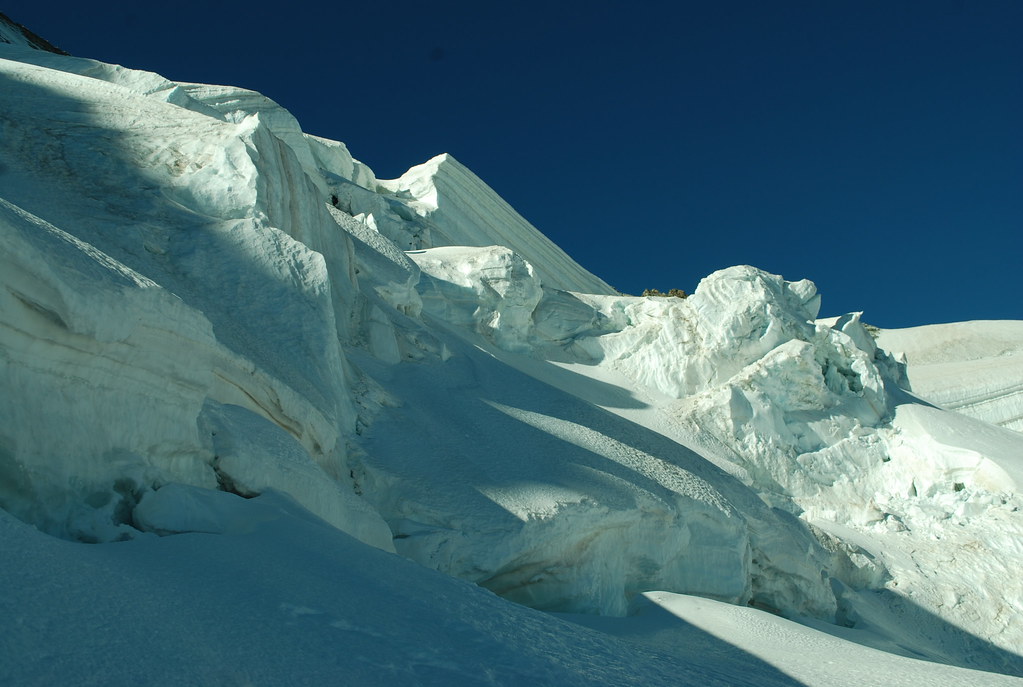 Time to declare this year's sea ice race over - thanks to those of you who pointed this out to me while I was on holiday. As an apology for the lack of interesting things to say about sea ice, there's a couple of nice pix of mountain ice at the end. Follow them to links to the full set but believe me there are far too many to look at. My lead pic I've ripped from Tamino; as compensation to him, if you click on it you'll get to his post.
Time to declare this year's sea ice race over - thanks to those of you who pointed this out to me while I was on holiday. As an apology for the lack of interesting things to say about sea ice, there's a couple of nice pix of mountain ice at the end. Follow them to links to the full set but believe me there are far too many to look at. My lead pic I've ripped from Tamino; as compensation to him, if you click on it you'll get to his post.
Before people get confused, I should point out that "dull as expected" just means "the long term trend of decline continues". Those predicting imminent catastrophe were quite wrong; those predicting miraculous recovery, ditto.
The sea ice post from June refers, by which point it was clear to me that I'm not going to win, but Rob might. To remind you, my bet with Rob for the grand sum of $10k was
If both NSIDC and IARC-JAXA September 2016 monthly average sea ice extent report are above 4.80 million km^2, RD pays WMC US$ 10,000. If both are below 3.10 million km^2, WMC pays RD US$ 10,000. In all other cases the bet is null and void.
The end result for the minimum - not the monthly average, which will be higher, since "recovery" has already started - was let us say 4 million. That's pretty well slap in the middle of our "null" range so the bet is null and void. That this would happen has been pretty clear for a bit, even if the extent last winter did give me cause to worry. I order to demonstrate my brilliant predictive skillz, in August I guessed that 2016 probably wouldn't scrape second; in the event, it just about did.
How could we make bets like this more exciting in future? I think that encouraging a lively reselling market in fragments of the bet might help generate more interest. But still, they are intrinsically multi-year slow bets, if they are to have any scientific validity.
[Incidentally, elsewhere while I was on hols CR asked Who gets to define (virtually) ice free arctic and do you see anything odd with what has happened with AR5?
I can understand that one year under 1m km^2 might well be an exceptional year and that might be too soon. But why would scientists decide there has to be 5 consecutive years under 1m km^2 rather than a 5 year average to be under 1m km^2? If we had just over 1m km^2 every 4th or 5th year the date of ice free might be delayed for a considerable period.
To which I'd say 1m km^2 is clearly arbitrary, but also (a) easy to compute and (b) a long way away; so its arbitrariness isn't currently a problem. As we get somewhat closer to it in a few decades people will probably re-think the criterion more carefully.]
For those still in suspense, it was the Ecrins of course, specifically the Dome de Neige des Ecrins. I wimped out of the Barre. As I say, more later.




It's not "dull" at all William! Due to the umpteenth Arctic cyclone this year the sea ice has been "remelting":
http://GreatWhiteCon.info/2016/09/september-arctic-cyclone-alert/#Sep-17
If I can embed an image:
Hmmm. That didn't work! How about a bare link instead?
http://greatwhitecon.info/wp-content/uploads/2014/04/UH-Arctic-Area-201…
2016 is in 2nd place for daily min, probably will be 3rd place for monthly.
A bet on climate that is reasonably fair, with nearly equal odds of winning and losing, will be the same thing as a bet on the roll of dice or the turn of a card. Except slower. Much slower.
Much much slower.
The interesting thing isn't that the luck of the draw favored Stoat this summer, after favoring Rob over the winter, but that the odds of the draw have shifted and will continue to shift.
I have a chance to bet (low stakes, friendly) with someone on sea ice 10 years into the future. We are trying to find a fair bet. What sort of thresholds should I expect for a fair bet?
My first guess was about 2 million km^2 on the low side, and 3.5 million km^2 on the high side.
On another note, and for amusement, and don't forget the comments:
https://stevengoddard.wordpress.com/2011/06/27/rob-dekker-throwing-mone…
"How could we make bets like this more exciting in future?"
Buy/sell shares in Arctic sea ice extent -- say, a dollar per Mkm2? (Perhaps in the 12-month moving average.)
Or global temperature. $100 per 0.01 C.
Since you bring the topic up Phil, on another note and just for amusement:
http://GreatWhiteCon.info/2016/09/dumb-and-dumberer-at-the-blog-of-fool…
"We can provide this preliminary report on the astonishing ignorance of Tony and his faithful flock concerning all things Arctic"
Don't forget the comments!
>"To which I’d say 1m km^2 is clearly arbitrary, but also (a) easy to compute and (b) a long way away; so its arbitrariness isn’t currently a problem. As we get somewhat closer to it in a few decades people will probably re-think the criterion more carefully."
1m is arbitrary, yes, but that isn't the problem - it is the change from five year mean to 5 consecutive years.
to quote Rob Dekker
"Here is the exact caption to the sub panel (c) of figure 2.1 on page 59 of this report :
... (c) Change in Northern Hemisphere September sea-ice extent (5 year running mean). The dashed line represents nearly ice-free conditions (i.e., when September sea-ice extent is less than 10^6 km2 for at least five consecutive years)....
The fact that the claim is in parenthesis should have been a hint that it was intended as clarification of the previous sentences, NOT as a new definition."
It looks like a clarification has been added which clearly misrepresents the science which was using 5 year mean changing it to 5 consecutive years then this 5 consecutive years seems to have propagated to various other locations
eg again quoting Rob Dekker
"AR5's summary report here :
https://www.ipcc.ch/pdf/assessment-report/ar5/wg1/WG1AR5_SummaryVolume_…
quotes on page 92 :
A nearly ice-free Arctic Ocean (sea ice extent less than 10^6 km2 for at least five consecutive years) in September before mid-century is likely under RCP8.5
That is about as clear as it gets."
This seems to me to have the feel of having been done without due process, but what do I know? While it could easily be me not understanding what has happened and there is nothing wrong, there also seems a possibility that it could possibly be a worse problem with abuse of due process than for instance the Himalaya 2035 2350 typo getting through (but in the other direction).
'when closer, re-think the criterion more carefully' may be sensible but that doesn't seem an adequate response to whether there may have been some abuse of IPCC processes. Sorry I didn't explain this question more clearly before.
[I agree that "5 consecutive" years is a bit odd and a 5-year-average would be more "normal"... but I can't get very excited about it, because it really doesn't seem to matter. Unless someone is interested in "exactly when is this likely to occur under scenario X" which is probably not a sensible question anyway, as it is so far off and not really interesting that there's no point looking at it in current models, unless you're whoring after a cheap paper -W]
I am not after a cheap paper but obviously cannot be as sure about motives of other people looking at it. If there had been some discussion and this was arrived at but likely to be refined later I wouldn't be too bothered about it either.
People looking for and not finding any evidence of any discussion seems a more serious situation to me. If that is correct, then it suggests someone has pushed through a new definition by introducing an error into what was supposed to be a clarification and then spreading that error.
People might read that summary and assume the definition has been discussed, a conclusion reached and the matter of how to define it is therefore settled (as far as anything ever is settled). If it looks odd enough to be suspicious, I am inclined to think it should be investigated even if the subject matter is fairly unimportant.
As it seems that our bet ends up in the "void" range, I can understand that you find this subject rather "dull".
But let me tell you that I respect your opinion, and I will buy you a beer any time.
And if you have a suggestion for a bet that would be more exciting (possibly with a better 'option' plan) please let me know.
On a different note, IPCC changed the definition of "ice-free" during the September 26-29 Stockholm session, from "less than 1 M km^2" to the obscure "less than 1 M km^2 after 5 consecutive years".
We know this change happened during the 36th session of the IPCC in Stockholm, because the addition “after 5 consecutive years” is NOT present in the June 7 ‘final draft SPM’ as prepared by WG1 :
https://www.ipcc.ch/pdf/assessment-report/ar5/wg1/drafts/WG1AR5-SPM_FD_…
and it IS present in the ‘approved SPM’ after the September 23-26 session :
http://www.ipcc.ch/meetings/session36/p36_doc3_approved_spm.pdf
And there seems to be no record of this change in the “differences” document that IPCC member countries signed off on during the Stockholm session :
http://www.ipcc.ch/meetings/session36/p36_doc4_changes_underlying_asses…
So the point I was trying to make, and the question that comes with it is :
WHEN exactly was this change in definition made, WHO changed it, under WHICH IPCC procedure, and WHY does it not show up in the “changes” document from the Stockholm session ?
Were you in Stockholm at that time, and/or do you know WHY and WHEN and HOW they could have changed the definition without it showing up in the "changes" document ?
[Having now looked I'm less convinced there's anything nefarious going on; but I wrote it up as http://scienceblogs.com/stoat/2016/09/20/dark-deeds-of-definitions/ for comment -W]
Ah. Crandles, you beat me to the punch.
William, even though the question has been asked twice now (first by crandles, second by me) since the SPM is based on evaluation of 9.200 peer-reviewed scientific papers, could you please look into this issue, and (for a much as you have been involved in the IPCC WGI process) explain to us how the definition of (nearly) "ice free" could have been changed without leaving a trace in the "change" document ?
[I have no personal experience but I'll see what I can do about finding out. Perhaps simply by blogging it -W]
So, you read science fiction, don't you?
What do you think of the England in Peter Hamilton's several large books? Back when portable phones were the size of small books, he was describing handheld "cybofaxes"), and England losing land to rising sea level and more intense storms, big population moves, and .... well, you can guess.
[I started reading TRD but it was unpleasant; so I stopped -W]
William, you identify as "dull" the developments of sea ice in the Arctic, but I'd say it has been, and is still, quite spectacular.
Not just the flying start of the melting season, and the massive stalls during June and July due to continued influx of lows, but also the August drops due to more storms, and the quick decline early September, followed by an early minimum and a brisk and according to some metrics unprecedented 'refreeze' over the last couple of weeks.
Anything but 'dull' in the Arctic as far as I see it...
Per ftp://sidads.colorado.edu/DATASETS/NOAA/G02135/Sep/N_09_area_v2.txt
2012 3.63
2007 4.32
2011 4.63
2015 4.68
2016 4.72
2008 4.73
2010 4.93
2016 came in 5th lowest place or maybe =3rd with 3 or 4 other years to ensure statistical significance.
[Thanks. So I didn't do so badly then -W]
>[I didn’t do so badly then -W]
Well I make the IJIS average 4.398 and you needed both over 4.8. So that measure isn't so close to a win for you.
There was an early minimum and strong growth after that early minimum which helped make it much nearer to a win for you than for Rob than looked to be the situation shortly before the minimum. The draw that it looked like being wasn't that bad and now it looks much closer to you winning rather than Rob.
So, 'Didn't do so badly' looks like a rather modest statement.
[Oh sorry no; what I meant was me guessing it would be about the 5th or so, a few months back -W]
IJIS / NIPR back to lowest for the last couple of days
https://ads.nipr.ac.jp/vishop/#/extent
making it ..... still dull as still on the low edge, I assume.
I agree about Hamilton's TRD. I held my nose and skipped through the needlessly ugly scenes in that book. He outgrew the thud-and-blunder writing, fortunately, in his later science fiction. Can't exactly say he developed a sense of humor, but glimmerings .... He did keep drowning the UK coastline and talking about where people would be moving and how, often.